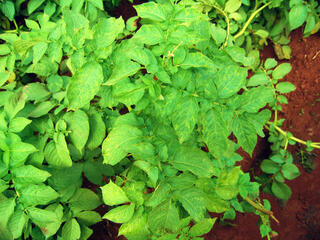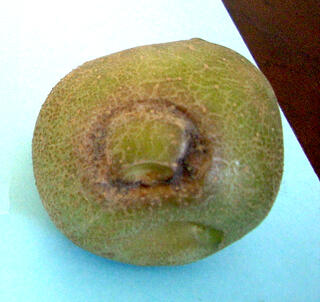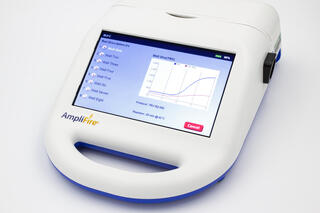
PVY Tuber Symptoms
--- FOR IMMEDIATE RELEASE ---
Agdia Commercializes Rapid Molecular Assay for Detection of Potato Virus Y
Agdia, Inc. (Elkhart, IN) is happy to announce their commercialization of a rapid and user-friendly, RNA-based assay, on their AmplifyRP® XRT platform, for the detection of Potato virus Y (PVY).
The potato plant, Solanum tuberosum, is one of the most important crops in food production. The plant’s starchy tuber is produced worldwide in temperate and tropical climates and is an integral component of global food security. Potato plants are susceptible to infection by a myriad of pathogens, including bacteria, fungi, nematodes, oomycetes, viruses and viroids. While many of these pathogens can induce local epidemics if left unchecked, Potato virus Y (PVY, Potyvirus) is considered by many to be the most important potato pathogen worldwide, causing up to 80% crop loss in heavily infected fields.

Potato virus Y is the type member of the Potyvirus genus and has a wide host range within Solanaceae. In addition to potato, this virus can cause severe crop losses in eggplant (Solanum melongena), pepper (Capsicum annuum), tobacco (Nicotiana spp.) and tomato (S. lycopersicum). Moreover, it is capable of infecting ornamentals such as Petunia spp. and numerous species of solanaceous weeds. Symptoms were first described in the early 1930’s on potato, making PVY one of the earliest known plant viruses. Nevertheless, it is within the last 25 years this virus has become a serious problem for U.S. production.
Potato virus Y exists as a collective of strains in a state of flux, due to its proclivity to accumulate mutations and undergo recombination between these strains. Most strains can be placed in one of three phylogroups: O (ordinary strain), C (common strain) and N (necrotic strain). Moreover, recombinants such as PVYO+C and PVYNTN exist within these larger phylogroups. This virus complex causes a wide variety of symptoms on tubers and foliage, impacting yield and seed quality. Strains within O and C groups will generally cause foliar symptoms, including mosaic, necrosis and premature leaf drop (Figure 1.). Severity of foliar symptoms will vary depending on the variety infected. Necrotic strains and associated recombinants are responsible for potato tuber necrotic ringspot disease (PTNRD) and are of particular importance to seed potato certification agencies (Figure 2.). In general, foliar symptoms induced by the necrotic strains are less severe than with the O and C strains. This makes accurate visual field diagnosis difficult.

All strains of PVY are spread locally by more than 50 aphid species (Hemiptera) in a non-persistent manner. Moreover, winged aphid adults can move long distances on air currents, spreading PVY between regional fields. This vectoring paradigm makes the use of insecticides ineffective for virus management. In addition to aphids, PVY can be spread efficiently within fields via mechanical means, such as plant-to-plant contact caused by wind or human activity. The most important source of primary inoculum is infected seed tubers, making certification of planting materials a paramount step in managing PVY.
Diagnosis of PVY by seed tuber certification agencies implements a multi-faceted workflow, but this workflow is not standardized between these agencies in the United States. This process typically includes a combination of pre-plant serological testing of tuber sprouts with ELISA and visual inspection of field-grown plants. Moreover, foliage is tested in the field during winter grow-out trials in locations such as Florida and Hawaii. Field tests are typically performed using a rapid serological diagnostic such as the ImmunoStrip® for detection of Potato virus Y. Molecular diagnostics such as qPCR are highly specific and sensitive. Nevertheless, the high throughput demands of tuber testing make widespread use of PCR cost prohibitive for certification purposes.

Agdia’s new AmplifyRP® XRT assay for detection of Potato virus Y is based on recombinase polymerase amplification (RPA). This technology promotes the rapid amplification and detection of nucleic acid targets, DNA or RNA, while maintaining a single operating temperature of 39o – 42oC. The AmplifyRP® XRT products achieve target sensitivity and specificity comparable to PCR, while having clear advantages over the lab-based technology. AmplifyRP® XRT products do not require a nucleic acid purification step; crude sample extracts are prepared using a simple extraction buffer and tested directly. This makes the testing process simple and saves the end user valuable time. Moreover, this facilitates the implementation of this technology at remote locations with limited resources. When paired with Agdia’s AmpliFire® isothermal fluorometer (Figure 3.), the XRT system is a rapid, user-friendly tool that can be implemented in the field or the lab by personnel with limited experience in molecular diagnostics.
Agdia states their new assay was screened against multiple strains of PVY, including PVYC, PVYO, PVYN, PVYO:C, PVYO+C, PVYO5, PVYNN, PVYNaN, PVYNTN, and PVYWilga, detecting all true positive samples of each strain. Moreover, exclusivity panels exhibited no cross reactivity with several common viral pathogens in potato, including Pepper mild mottle virus, Potato leaf roll virus, Potato mop top virus, Potato virus A, M, S, T, V, X, Tobacco etch virus, Tobacco rattle virus and Tomato spotted wilt virus. This assay exhibited sensitivity comparable to that observed with the published qPCR assay Agdia evaluated during validation. This assay contains an internal control and was developed to test leaf and sprout tissue. For more information on Agdia’s complete line of AmplifyRP® assays, please visit Agdia’s website www.agdia.com.
About Agdia
A leading provider of diagnostic solutions for agriculture, Agdia, Inc. has been serving plant breeders, propagators, growers, universities, regulatory organizations and private testing laboratories since 1981. The company offers a comprehensive portfolio of validated, easy-to-use diagnostics for identifying plant pathogens, plant hormones, and transgenic traits. Moreover, Agdia operates an ISO accredited, in-house, testing services laboratory. Agdia’s quality management system is ISO 9001:2015 certified and their Testing Services Laboratory is ISO 17025:2017 accredited. Visit the company’s website at www.agdia.com, e-mail info@agdia.com, phone 1-574-264-2615 (toll-free 800-622-4342) or fax 1-574-264-2153.
###





